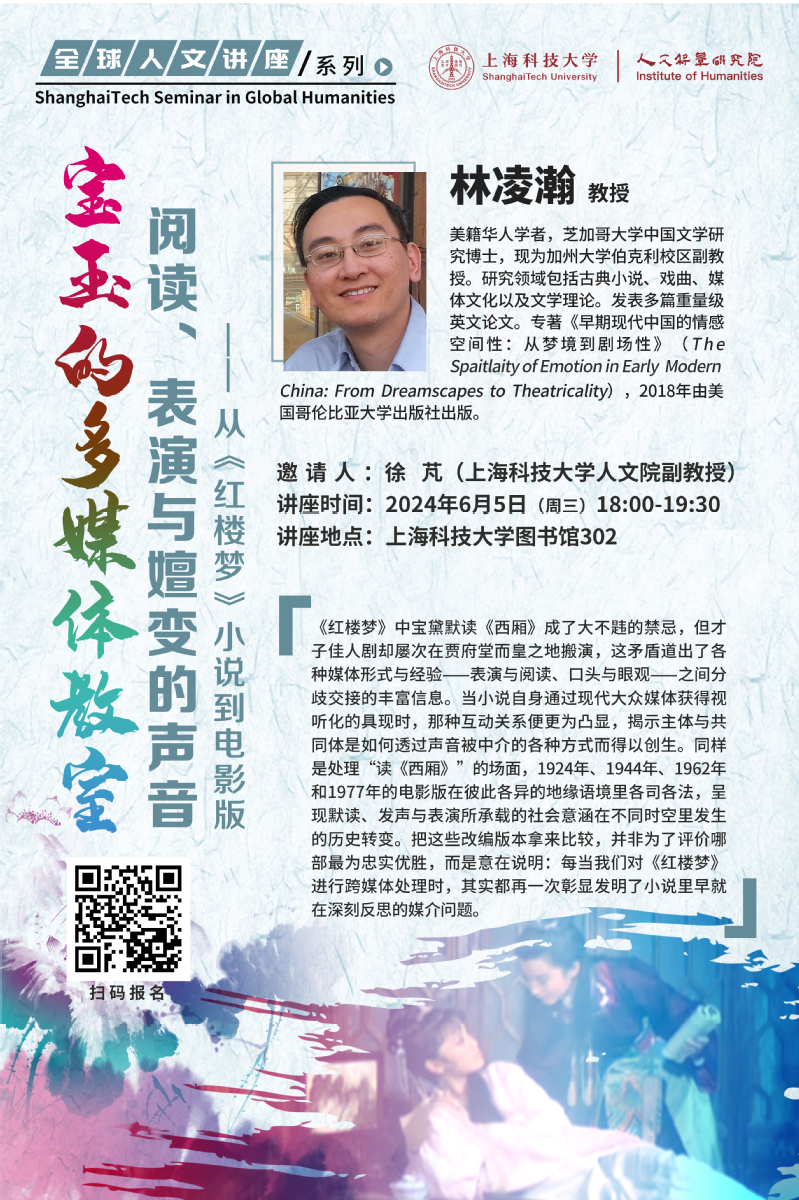
Dear all,
The first lecture of ShanghaiTech Seminar in Global Humanities will be hold at 18:00 on June 5th in Room 302,Library. Welcome!
Title: Baoyu’s Multimedia Classroom: Performance, Reading, and the Vicissitudes of the Voice in The Story of the Stone and Its Film Adaptations.
Abstract:The eighteenth-century Chinese novel The Dream of the Red Chamber has become inextricably woven into modern mass media culture. Renditions across media boundaries do not simply adapt the story to various degrees of faithfulness. Rather, they foreground the very concern about the conjunction and disjunction between different media, which is already expressed at the heart of the novel: Why throughout the story is it acceptable to enjoy the performance of a love scene along with others, whereas reading a playbook on one’s own is problematic? Why, despite her acclaimed sensitivity, has Lin Daiyu never lend an ear to the performance of any romantic plays until after she silently read one of them? This differentiation and interplay of performance/reading and orality/occularity, so central to the construction of communality and interiority in the original novel, is foregrounded when the story itself is visualized and vocalized in modern media. Focusing on three film adaptations of The Dream of the Red Chamber made in 1944, 1962, and 1977, this paper shows how the presence or absence of the voice conjures up diverse and ambivalent effects upon our imagination of community and individuality in various geopolitical contexts: wartime Shanghai engulfed in Pan-Asianism; Shanghai (coupled with Hong Kong) amid the ephemeral economic reform in the early 1960s; and late 1970s Hong Kong (coupled with Taiwan) driven by financial capitalism. Socio-cultural changes at these three historical junctures can only be fully understood through the issue of media first raised back in eighteenth-century China.
Speaker:Ling Hon Lam, associate professor at the University of California, Berkeley, received his Ph.D. at the University of Chicago. He was an An Wang postdoctoral fellow at Harvard University and a Newhouse research fellow at Wellesley College in 2010-11. His research and teaching interests cover premodern drama and fiction, sex and gender, history and theory of emotion, nineteenth- and twentieth-century media culture, and critical theories. He is the author of The Spatiality of Emotion in Early Modern China: From Dreamscapes to Theatricality (New York: Columbia University Press, 2018). His articles appear in Harvard Journal of Asiatic Studies, Opera Quarterly, East Asian Publishing and Society, CLEAR, and Journal of Chinese Literature and Culture. His new project is concerned about media forms, energy, and information in early modern China.
Inviter:Xu Peng (Associate Professor, Institute of Humanities, ShanghaiTech University)
Registration link:https://wenjuan.shanghaitech.edu.cn/vm/O0uE5QQ.aspx
